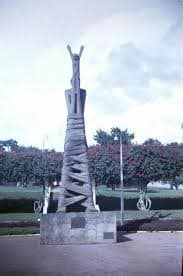#OutToLunch: What Africa must do in the next 60 years of independence
By Denis Jjuuko
Many African countries have clocked 60 years since they became independent from the colonizers.
Last week, Uganda marked its 62nd anniversary. The anniversary came at a critical time when a government agency revealed that at least Shs25 billion or approximately US$6.7m is lost to corruption daily.
I think the richest countries in the world are in Africa. Imagine losing US$6.7m a day and we still exist. The figure may not even be accurate. Government agencies tend to be conservative when revealing these things.
Anyway, the majority of African leaders spend half their time blaming colonialists and western powers while accepting every invitation to the White House, 10 Downing Street and the Elysée Palace. Their public relations handlers and influencers even brag about such invitations. Photos in the White House are shared with glee.
On return, they tell us the reason why we are poor is because of western powers and vow to fight and defeat them. The African masses, eager to attend the rallies, so that they can get their once in a year doze of protein from the meat being served, clap, clench their fist and vow to fight back. In the presidential mansions, the Africans tell their western counterparts, that whatever they said was just “managing politics.” They seek for another invitation to Washington, London and Paris.
How can Africans manage the next 60 years of their independence? At least by not spending half their time blaming the westerners. Africa was not the only colonized continent. The British, for example, colonized many parts of Asia and Middle East. How did some countries in Asia and the Gulf managed to develop, some in a little time than Africa?
Take the example of the United Arab Emirates, it only became independent in 1971, a decade after most African countries had become independent. They were a barren desert. Today, Africans go there for honeymoon, medical treatment, university education and some even invest in properties there.
The simplistic story is that UAE had oil. But it isn’t the only one with oil. Libya, Sudan, Nigeria, and Angola among others have oil. The countries mentioned above also have access to the sea just like the UAE. However, the African countries had even more favorable weather than the harshness of the Dubai or Abu Dhabi deserts. But today, Africa almost has no single city that is at the level of Dubai. South African cities are deteriorating at the speed of a rocket.
If the British, French and Americans sabotage Africa like African leaders and intellectuals always claim, how come they didn’t do that to the Asians and countries like UAE? They were still interested in oil in UAE. They were still interested in access to the sea as they are today.
If African leaders wished to develop their countries, I believe they would without anyone in the west stopping them. Does the west, for example, stop any African city from finding solutions to their garbage problem? I believe many western powers would actually want their businesses to invest in solving the garbage issue so that they can make money out of it.
Does a western power tell a procurement officer to give a contract to the most incompetent company to construct a road? Most road projects, for example, in Uganda are so small for any western power to get utterly interested.
I mean, if you are constructing a 21km four lane northern bypass worth a few million dollars, why would the west be so interested in stopping it? The other day, I saw a road agency happy to report that they will construct 6km a year of an expressway. Imagine just 6km a year of a four-lane road! Now, imagine if the country had more ambitious projects, how long would they take to achieve them?
African leaders are these days summoned to every Asian capital for some African Summit. The other day I saw poor Indonesia summoning them and they all went or sent their deputies. What is in Jakarta that Africans can’t do?
Ok, if they go there, what do they learn? How has Indonesia managed to ‘develop’ that it can now summon African presidents to go for a summit? And when they return what can they do so the countries can develop?
In the next 60 years, Africa must be deliberate to write a new chapter. The colonialism and neocolonialism rhetoric has run its course. There are 1.4 billion people in Africa. They need to see a continent that works for them, not one that talks about issues of the past 60 years. it is time to create an enabling environment that enables Africans to thrive.
The writer is a communication and visibility consultant. djjuuko@gmail.com










